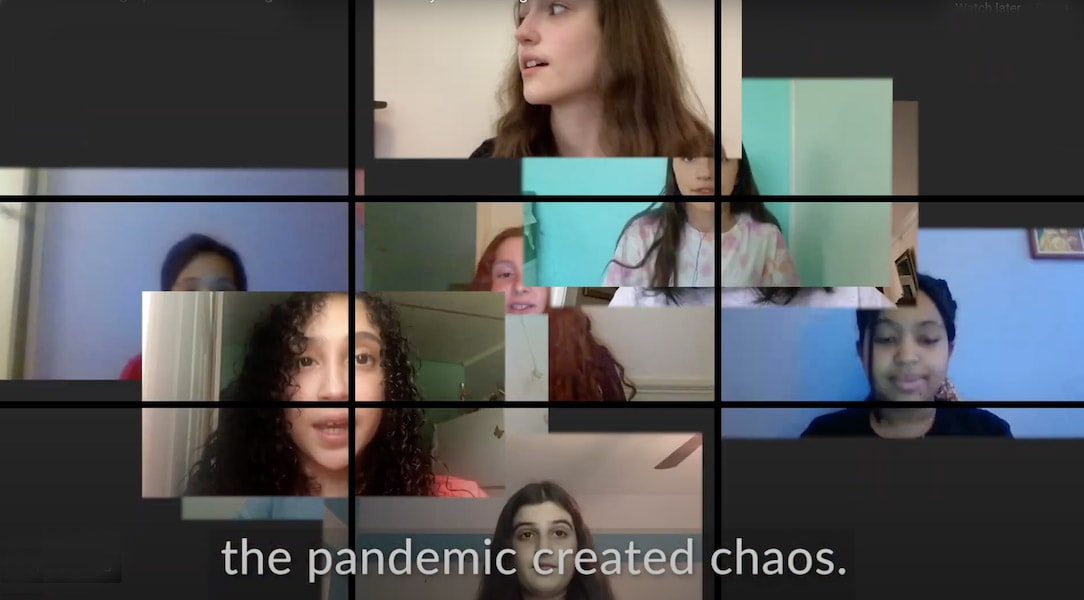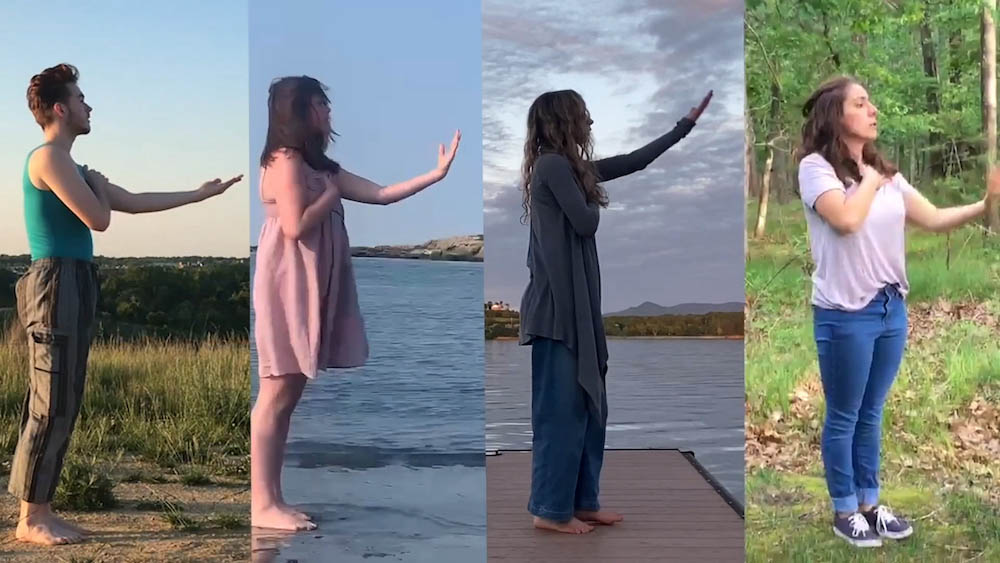When Washington, DC-area school closings became a part of the disruption that accompanied the terror and uncertainty of the spread of COVID-19, we heard much from parents (and much less from young people) about how these changes were affecting our lives. Now we hear of the emergence of the possibly more infectious delta variant of the virus. And even though 1) people under the age of 12 are not able to receive the vaccine, and 2) some parents object to the mandate to use masks or to vaccinate their children whatever their age (or even themselves) as protection from infection by the virus, schools, in DC and nationwide, have nonetheless reopened.

Despite all the sound bites we hear on the news about this state of affairs, young people remain voiceless in the midst of this pandemic. There are questions we could ask: What are young people seeing? What have their experiences of this time been? What do they need? What would they say about what is happening around us? In other words, what do young people have to contribute to our citywide, nationwide, and humanitywide conversation? Through Voices of Now, a program that engages young people in the theatermaking process, Arena Stage has sought to provide a space for young people to have the voice that they need (and that adults need to hear) at this time.
Voices of Now is a year-long drama program that works with ensembles of middle school, high school, and adult artists to devise autobiographical theater pieces. Waiting Room is the project that Voices of Now produced this past June. Like much of the theater work produced during the pandemic, it is on video rather than onstage. More than 120 student artists participated in the creation of this work, which began streaming on June 26 and which has only become more pertinent with the reopening of schools in August. (Streaming continues, free, on Arena’s website and on YouTube.)
If you are as vague as I was around the meaning of the term devise when referring to theater, Wikipedia offers this:
Devising is a group collaboration in response to a stimulus leading to the creation of an original performance. Devising in drama demands inventiveness, an understanding of the rules of structuring a piece of theatre and a readiness to collaborate with others.
The title Waiting Room turns out to be the metaphor to describe the state of being these young people are experiencing while living in our present era. One of the first responses we hear to the stimulus offered in this production, is:
I’m waiting for the outside to feel less scary.
That describes how many of us are feeling no matter what our age.
Waiting Room shows us young people demonstrating the critical thinking, problem solving, and empathy that we need to get us out of the mess we are in.

Through animation, music, live action, and dance, Waiting Room takes us on a journey from the days when COVID seemed distant for some of us to the moment when it touched the lives of family members and, with the deaths of friends or family, it became a visible and undeniable reality. We see how school and other dreams became deferred and, once school was allowed to begin again, the ways in which it and everyone changed.
Here are a few statements that stood out for me:
Your own mindset is going to be your biggest challenge.
Hope will be the only thing that will get you through this.
There are no shortcuts left. No corners to cut. I have to do things the hard way now.
And what for me was the understatement of the entire piece:
I think we’ve been adaptable.
Helpful and engaging, Waiting Room is a kind of 21st-century Prairie Home Companion, providing us with language to talk about what we’re all going through now and, like Mr. Rogers (someone who also allowed children a space for their feelings and observations), the comfort of knowing that none of us is alone. (It comes as no surprise to find that Voices of Now partners with The William Wendt Center for Loss and Healing, which is the city’s preeminent support resource for navigating grief, loss, and trauma. The Wendt Center folks are experts in accompanying people on difficult journeys as they learn to speak about the unspeakable.)
Noting that everyone is experiencing COVID differently, one participant asks: “What is the roadmap for grief?” Aware of how unexpectedly their familiar rituals of daily engagement have shifted or disappeared, and wondering about the feasibility of a speedy and enforced returning to normal, one student wonders: “What is normal?” Another simply states: “I’m still afraid.”
Waiting Room is both thought provoking and comforting. If you have young people in your household, you might find it especially worthwhile to watch this with them. It reminds us of how much (especially during scary times — both in the theater and in life) we need to be with and collaborate with on. And how creative we can be when we choose to do so.
Running Time: Approximately 48 minutes
WATCH NOW:
Waiting Room: A New Film by Arena Stage’s Voices of Now Ensembles
SEE ALSO:
Youth respond to COVID-19 in heartfelt ‘Inside Voices’ film from Arena Stage by David Siegel
Hear voices of Generation COVID in ‘Waiting Room’ from Arena
Voices of Now Teaching Artists: Ky’Lend J. Adams, Josh Bickford, Rebecca Campana, Iesha M. Daniels, Ashley Forman, Olivia Jones, Kerry McGee, Mauricio Pita. Waiting Room Creative Team: Directors: Ashley Forman and Mauricio Pita; Film Editor: Antonio Hernandez; Motion Graphics Designer: Shawn Duan; Music Composer: Roc Lee. Advocacy Ensemble: Alexandra Berrios, Colby Molleo, Gabriella Giegerich, Madelynn Washburn, Mia Heckler, Morgan Sheets, Patrick Payne. Glasgow Ensemble: Amira Menacer, Brooke Ehmann-Jones, Caledonia Ross, Charlotte Holbrook, Juliette Jensen, Lina Rosenbaum, Nadeen Salah. Holmes Ensemble Alex Gardner, Diana Mendez, Gabriela Daniel, Isabella Falcone, Noelia Gil, Sophia Beltran, Sylvie Bankseter. Jefferson Ensemble: Autumn Drake, London Williams, Lucea Matuszeski. Key Ensemble: Alli Holtmann, Caylee Gross, Dayanara Cabrera, Lesly Cruz Pastora, Sajidah Algadhi, Sarah Adkins. Mead Ensemble: Claire Filipowicz, Cora Bower, Isabella Guagenti, Izabella Ciceron, Jasper Lavan, Joshua Reynolds, Mira Herman, Sitina Tochterman, William Peck, Yalini Kathamuthu. Mentor Ensemble: Chloe Lanyi Lari, Christina Springer, Danielle Kelly, Edie Carey, Jaeyoung Lee, Julia Gorman, Katie Hindin, Nora Shafer, Reed Roddy-Johnson, Reyna Berry, Winta Habtemichael, Zarah King, Zoey Miller. Robinson Ensemble: Alison Ho, Azariah Gonzales, Ben Sklarew, Daphne Taylor, Elise Hayes, Faith Brosnan, Isabella Ragona, Jamie McCormick, Jasmine Sklarew, Kira Gilligan, Lillian Schermer, Lydia Klosk, Maia Lawton, Matthew Lin, Sophie Hoffman, Victoria Machado. Thoreau Ensemble: Alex Emmerich, Anna Glassman, April Jin, El Tysse, Emi Harrison, Jenna Jumaili, Kyle Ratner. Wendt Center for Loss and Healing Ensemble: Alison Brown-Smith, Charlotte Covell, Monique Johnson.




